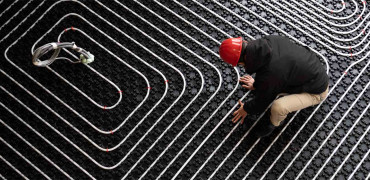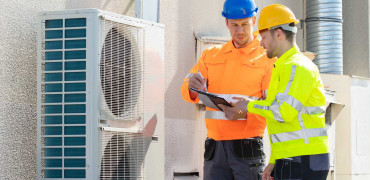Like a lot of society, training had to change because of the pandemic and the long period where we weren’t allowed to physically mix.
That made us review our whole training process and we’ve developed an Award-winning online programme that helps engineers understand things much more clearly, before they need to come and get their hands on our equipment.
When we did come back into the ‘classroom’, this meant quite a bit more travel for me, as I’ve taught engineers in both our Manchester and Hatfield training suites.
So, when I was asked recently if I noticed any differences between southern engineers and their northern counterparts, I had to stop and think whether there were any differences – except for the colour of the tea!
There is a fantastic opportunity to make a very decent living installing heat pumps
The end of gas
What I would start by saying is that both north and south engineers all attend the training with the same openness and are all eager to learn.
The majority of heating engineers I see all come from the same background in the gas industry, so they approach the training with the “evolve or die” mindset.
They have realised that we are at the end of gas, that a low carbon heating solution is the future for home heating, and they need to upskill to stay ahead of the trend.
Public versus private
The biggest difference I find up north is that a lot of the engineers are employed by housing associations and 100% of their work is being carried out in social housing.
Could this be down to a bigger driving force from Northern councils in decarbonising their housing stock? Or just a better understanding of what needs to be done to secure a better future?
Most engineers I have had the pleasure of training in Hatfield seem to be from large privately owned companies or self-employed individuals, whose work is predominantly working in private households, in retro fits or in new self builds.
I have yet to train anyone from a company working directly for a housing association or who has a contract with local councils, but I think this may just be me.
My colleagues report that there are certainly heating companies that work with housing associations in the south but I have carried out a vast number of training and yet to recall a single company.
In the main though, this does seem the biggest difference between north and south engineers. North seems focused more on social housing, the south more on private homes.
Get rich quick brigade
In addition to existing companies looking to add renewable heating to their existing skillset, I’ve also noticed a marked increase in companies coming into training who are very new to the industry.
In the main, these engineers share the same drive and passion for heat pumps as the low carbon solution.
However, I do notice the odd engineer who seems to see renewable heating as the next ‘get rich quick’ scheme, although they don’t leave my training without this being challenged.
This search for ‘easy money’ is not new and I’ve likened the current heat pump market to the double-glazing craze of the 1990’s, when they earned their “white gold” nickname. Double glazing had unscrupulous operators who had no regard for either the homeowner or the technology.
A sustainable business
But the market is quickly settling and there is absolutely no doubt in my mind that there is a fantastic opportunity to make a very decent living installing heat pumps.
Firstly, there is plenty of work to come with millions of homes and commercial properties needing to decarbonise and move to sustainable heating.
Secondly, you can take pride in being part of the future and helping both businesses and individuals do their bit by reduce the amount of carbon from their heating.
Coming back to any differences, I can honestly say that even though we may take our teas differently, both northern and southern engineers all share the same passion for heat pumps and driving the net zero goals one installation at a time.
Chris Thornton-Riley is a Technical Trainer at Mitsubishi Electric




